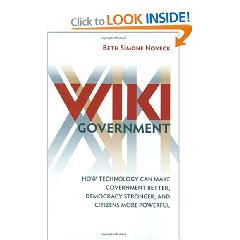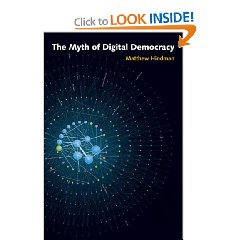
Wiki Government: How Technology Can Make Government Better, Democracy Stronger, and Citizens More Powerful
“A sweeping visionary yet highly pragmatic book! Beth Noveck concretely shows how to leverage the participatory nature of web 2.0 technologies to build a new kind of participatory democracy and a smart, lean government. She speaks from experience. A must read not just for policy folks and the digerati but for any of us wanting to understand how to tap the collective and diverse wisdom of the America to create a better, more connected style of democracy.”
Phi Beta Iota: Focuses on the patent process–use Look Inside to study contents before making a purchase decisioin. We have ordered the book and will review it within the week.

The Myth of Digital Democracy
Both utopian and dystopian interpretations have been made of the Internet's influence on many spheres of life–and democracy is no exception. . . . Absent from much of this debate is evidence-based analysis of the effects of the Internet on the business of politics. Many theories have been built on nothing more than anecdote, inference and assertion. In The Myth of Digital Democracy, political scientist Matthew Hindman fills important gaps in the evidence base, and does so accessibly.
Phi Beta Iota: This book has also been ordered and will be read and reviewed within the week. There are actually five different threads that will determine the future of democracy in the USA:
1. Citizen activism–who decides to get back into civic duty
2. Political integrity–keep the two-party tyranny or restore the Republic?
3. Digital technologies including processing–like the Diebold voting machines that have been hacked and proven to be a tool in favor of whatever Secretary of State is managing them, digital technology is a two-edged sword.
4. Access to real world information in real time–are we digitizing Kum Ba Ya hand-holding, or actually giving the public public intelligence (decision-support) in the public interest?
5. How do we integrate the five billion that do not have digital access? How important is the cell phone with call centers in all languages as a vehicle for both creating infinite wealth and enabling low-cost democracy (as opposed to high cost authoritarianism and ideological tyranny however velvet the glove?



